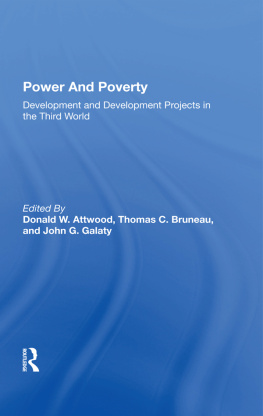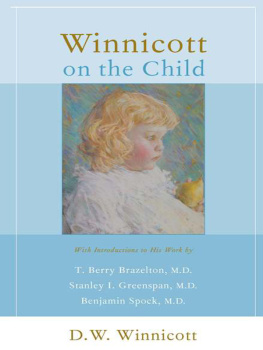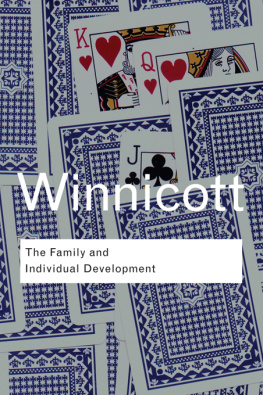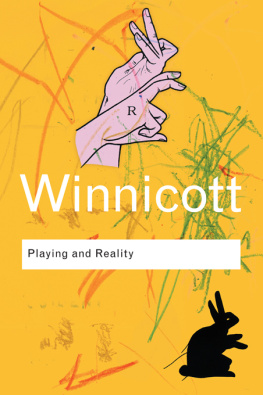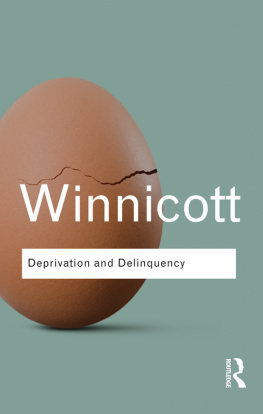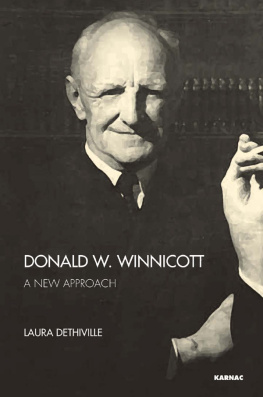This volume brings together Dr Winnicotts published and unpublished papers on psycho-analysis and child development during the period 19571963. The series of papers presented here complements those published in Collected Papers: Through Paediatrics to Psycho-Analysis (London: Tavistock Publications, 1958).
There are two bibliographies at the end. The first includes all the books and papers referred to in the text. The second gives a list of Dr Winnicotts writings from 1926 to 1964.
In order that the text itself shall not be encumbered with too many cross-references and footnotes the inter-relationships of the themes and concepts discussed in Dr Winnicotts papers are provided in the index. The major themes are also broken down into sub-categories and indexed in such a way that the various implications and connotations of an idea become readily available to the reader. The basic concepts of Freud are indexed in relation to Dr Winnicotts discussions or elaborations of them. Quite often Dr Winnicott has taken a Freudian concept as his given frame of reference but has not discussed it as such, and it is intended that the index should in part remedy this by pointing out the links between Dr Winnicotts ideas and those of Freud.
M. Masud R. Khan
Associate Editor
The main theme of these collected papers is the carrying back of the application of Freuds theories to infancy. Freud showed us that psycho-neurosis has its point of origin in the interpersonal relationships of the first maturity, belonging to the toddler age. I have played a part in the exploration of the idea that mental hospital disorders relate to failures of development in infancy. Schizophrenic illness in this way shows up as the negative of processes that can be traced in detail as the positive processes of maturation in the infancy and early childhood of the individual.
Dependence in early infancy is a fact, and in these papers I have tried to take dependence right into the theory of personality growth. Ego-psychology only makes sense if based firmly on the fact of dependence, and on the study of infancy as well as on the study of primitive mental mechanisms and psychic processes.
The beginning of ego emergence entails at first an almost absolute dependence on the supportive ego of the mother-figure and on her carefully graduated failure of adaptation. This is part of what I have called good-enough mothering; in this way the environment takes its place among the other essential features of dependence, within which the infant is developing and is employing primitive mental mechanisms.
One aspect of the disturbance of ego emergence produced by environmental failure is the dissociation that is seen in the borderline case in terms of the true and the false selves. I have developed this theme in my own way, seeing the representatives of this dissociation in healthy persons and in healthy living (private self reserved for intimacies, and public self adapted for socialization), and also examining the pathology of the same condition. At the extreme of illness I see the true self as a potentiality, hidden and preserved by the compliant false self, which latter is then a defence organization that is based on the various functions of the ego apparatus and on self-caretaking techniques. This relates to the concept of the observing ego.
Following up the idea of absolute dependence in earliest infancy I put forward a new way of looking at classification. My intention here is not so much to label personality types as to promote thinking and research into those aspects of the psychoanalytic technique which relate to meeting the patients need in terms of dependence in the analytic relationship and situation.
The origin of the antisocial tendency is discussed. It is postulated that the antisocial tendency is a reaction to deprivation , not a result of privation; in this way the antisocial tendency belongs to the stage of relative (not absolute) dependence. This point of origin of the antisocial tendency in a childs development may even be in latency, when the childs ego has established autonomy and now therefore the child can be traumatized instead of distorted in regard to ego-functioning.
As a corollary to all this, the more psychotic disorders are seen to be closely related to environmental factors, whereas psychoneurosis is more essentially natural, a result of personal conflict, and not to be avoided by satisfactory nurture. It is further discussed how it is in the treatment of borderline cases that these new considerations find practical application, and indeed such treatments provide the most fruitful and accurate data for the understanding of infancy and of the dependent infant.
Acknowledgements
First I wish to acknowledge my debt to my psycho-analytic colleagues. I have grown up as a member of this group, and after so many years of inter-relating it is now impossible for me to know what I have learned and what I have contributed. The writings of any one of us must be to some extent plagiaristic. Nevertheless I think we do not copy; we work and observe and think and discover, even if it can be shown that what we discover has been discovered before.
I have found great value in travelling abroad and in discussing my ideas with those who work in analytic, psychiatric, paediatric and educational settings, and in society groupings that differ from those that obtain in London.
I wish to thank my secretary Mrs Joyce Coles whose accurate work has been an important part of each of these papers at its original coming to life. I am also grateful to Miss Ann Hutchinson who has prepared the papers for publication.
Lastly, I thank Mr Masud Khan, who has provided the drive which has resulted in the publication of this book. Mr Khan has given a great deal of his time to the work of editing. He has also made innumerable valuable minor suggestions, most of which I have accepted. He is responsible for my gradually coming to see the relationship of my work to that of other analysts, past and present. In particular I am grateful to him for his preparation of the index.
D. W. Winnicott
Part One
Papers on Development
1
Psycho-Analysis and the Sense of Guilt
In this lecture I shall reach to no more profound statement than that of Burke, who wrote two hundred years ago that guilt resides in the intention. The intuitive flashes of the great, however, and even the elaborate constructs of poets and philosophers, are lacking in clinical applicability; psycho-analysis has already made available for sociology and for individual therapy much that was previously locked up in remarks like this one of Burke.


